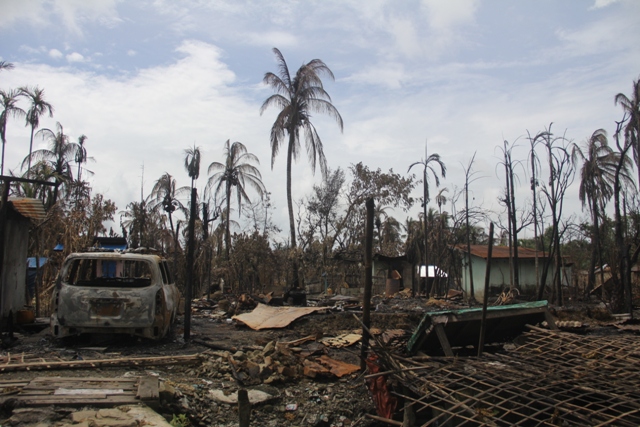Economic sanctions were lifted but an arms embargo remains. What good is an arms embargo if Washington and Brussels allow their ally Israel, along with world powers like China, to keep selling arms to Burma?
By Eitay Mack

In light of the atrocities being perpetrated against the Rohingya Muslim minority in Burma, many in the European Union and in the U.S. have denounced Nobel Peace Prize Laureate Aung San Suu Kyi, expressing deep disappointment with her conduct. In fact, their denunciations and disappointment should be addressed to themselves. As in other parts of the world, Europe and the U.S. have chosen to return to business-as-usual at the first opportunity, whitewashing the crimes of the past, evading a true accountability process, and ignoring the structural problems in Burma.
Without absolving Aung San Suu Kyi of her moral and political responsibility for the atrocities, one should note that from the beginning her formal role in Burma was nothing but a facade for a fictitious democratic process. She was not given effective control of the state’s security forces or a chance to advance real reform. Around 25 percent of seats in the parliament are reserved for the military, which is in charge of the Ministries of Border, Defense and Home Affairs, as well as appointing numerous civil servants.
The ongoing ethnic cleansing waged against the Rohingya is exceptional in its tremendous scope, but not with respect to the Burmese security forces and their allied militias’ patterns of action. For decades, the burning of villages, looting, collective punishment, population transfer, rape, torture, murder and forced disappearance — the denial of basic human and civil liberties — have been daily tools of the Burmese regime in areas of internal conflict. The EU and the U.S. know this full well, yet in September 2016 the Obama Administration concluded the lifting of economic sanctions that had been imposed on Burma. The EU did so as early as April 2013. The lifting of sanctions included no clear timetable for a transition to true civil government in Burma, nor did it include the requirement to investigate or indict those responsible for the crimes committed there. The latter were allowed to retain their power, and some of them are complicit in the ongoing crimes against the Rohingya.

In spite of the lifting of economic sanctions, the European Union and U.S. have maintained an arms embargo on Burma. But what is the significance of this embargo, if the two powers’ close ally, Israel, signed an arms-sales, training and intelligence sharing agreement with Burma in September 2015, including the sale of attack boats and guns? Last month, at a United Nations Security Council session, American UN Ambassador Nikki Haley called on world governments to freeze arms transfers to Burma. If this is Washington’s position, why has Haley not briefed Jerusalem? On June 5th, in response to a query by Israeli Member of Knesset Tamar Zandberg about the sale of arms to Burma, Israeli Defense Minister Avigdor Liberman replied: “As to Burma, …there are monitoring authorities in charge of exports … which maintain close contact with U.S. authorities, and we follow the same rules of the game.”
Have we returned to the 1970s and 1980s, the days of embargoes and restrictions on U.S. arms sales to juntas in Latin America, which Israel simply ignored? The latter sold arms worth billions of dollars to the aforementioned regimes. In view of China’s position, as well as its massive long-standing military aid to Burma, there is obviously no chance for a UN Security Council resolution imposing an embargo on Burma, but what’s stopping the EU and the U.S. from denouncing China and Israel? The reason is their political and economic interests. A strong denunciation of Chinese policy was not issued even last July, when Chinese political prisoner and Nobel Peace Prize laureate Liu Xiaobo died.
Similarly, the Trump Administration has lifted American economic sanctions on the genocidal Sudanese regime, mostly due to Khartoum abandoning its alliance with Iran, and its entrance of the “global war on terror.” According to Israeli newspaper Haaretz, this was done with the encouragement of the Israeli government. Washington settled for a decrease in Sudanese government attacks on rebel-held areas and increased freedom of action for humanitarian NGOs active there, the State Department explained. Lifting sanctions on Khartoum did not include requirements of structural changes to its security forces and state authorities, which might have ensured a real improvement in the long run. It is obvious that as long as Sudanese dictator Omar al-Bashir is allowed to remain in power, this will not be attained. Such outcomes convey a startling message to dictators across the world: join the “global war on terror” and we will turn a blind eye to your involvement in genocide.
The U.S. and Europe cannot force a democratic transition. Their moral standing to do so is dubious in the first place, considering their own involvement in colonialism, imperialism, wars of choice and mass atrocities across the world. However, and in spite of their internal problems, the U.S. and EU can still refrain from doing business with, and lending military assistance to murderous dictatorships. They can also prevent their closest allies, such as Israel, from doing so. The local democratic forces in Burma, Sudan or anywhere else cannot succeed as long as Europe and the U.S. support their enemies directly or indirectly. Since it seems neither the EU nor the U.S. have the patience or will to invest economically or politically in long-term democratic transition processes, structural reform and accountability, the responsibility for the ongoing atrocities lies not just with Khartoum or Yangon but also with Brussels and Washington.
Eitay Mack is an Israeli human rights lawyer working to stop Israeli military aid to regimes that commit war crimes and crimes against humanity. He has petitioned the Israeli Supreme Court to stop Israeli arms sales to Burma. Translated from Hebrew by Ofer Neiman.
